英语六级冲刺听力讲义
六级考前紧急救援讲义

六级考前紧急救援9小时讲义六级紧急救援9小时听力讲义听力小问答问:考场没时间看题怎么办?问:考场来不及涂卡怎么办?问:做题的时候走神怎么办?问:做题的时候不知道什么时候该看哪道题了怎么办?问:什么都听不懂怎么办?问:听力有技巧吗?技巧适用所有题吗?问:时间不多了,我基础差,还来得及吗?背单词还有用吗?还有希望吗?还能过吗?问:上完课,我课下该怎么练习啊?问:为什么全是问,没有答?……答:因为这些就是我上课会讲的内容啊~所以请把问题藏到肚子里,上课前和上课时先不着急向我倾诉你的困惑。
听我讲完3节课,包你豁然开朗。
第1节课(目标:9道切片小题让你掌握基本技巧,瞬间涨分)一,简发指题:长对话:1. A) To go sightseeing.B) To have meeting.C) To promote a new champagne.D) To join in a training program.短文:2. A) Her widespread influence among members of Congress.B) Her ability to communicate through public speaking.C) Her rigorous training in delivering eloquent speeches.D) Her lifelong commitment to domestic and global issues.演讲:3. A) Those who have enough time for holidays.B) Those who are too busy to make perfect private plans.C) Those who seldom do time management.D) Those who have got a messy life.答案:略。
最新六级考试听力讲义汇编

大纲要求-选材原则
对话部分为交际场合中的一般对话 短篇听力材料为题材熟悉的讲话、叙述、
解说等 词语不超出教学大纲词汇表四级规定的
范围
考查形式和评分标准
考试时间35分钟 Section A,共15题,15分 8个短对话,每题1分,共8分 2个长对话,两篇7道小题,每题1分,共7分 Section B,共10题,每题1分,共10分 数篇短文理解 每篇有2-4道题,每题为1个问句 Section C ,共10分 8个单词填空 3个句子
六级四级的区别
词汇 词汇量大 考查习惯用语、俚语等 文章难度 文章题材更广 提供信息点比较含蓄 更注重对学生理解力、思考力
解题技巧
有让步句,答案在主句 有强调词,短语是答案处 最高级词处有答案 虚拟 特定句型:why not… What about…. ; Can’t
医生看病: operation, surgery, prescribe some medicines, run a fever, have a running nose, nose congestion, take the temperature, sore throat, cough, pills, tablets, loose bowels, headache
(顿悟原理)
听力习惯
听力坏习惯:
• 晚上听着入眠 • 闭眼
听力的正确习惯:
• 最好的时间留给听力 • 利用选项作笔记
主题场景归纳
体育运动: exercise, tennis ball, football, tournament, fan
学校生活: grade, scholarship, semester, paper, assignment, computer failure, cafeteria, academic, part-time job, compromise, consultant, councilor,
考神团队六级冲刺抢分班听力补充讲义
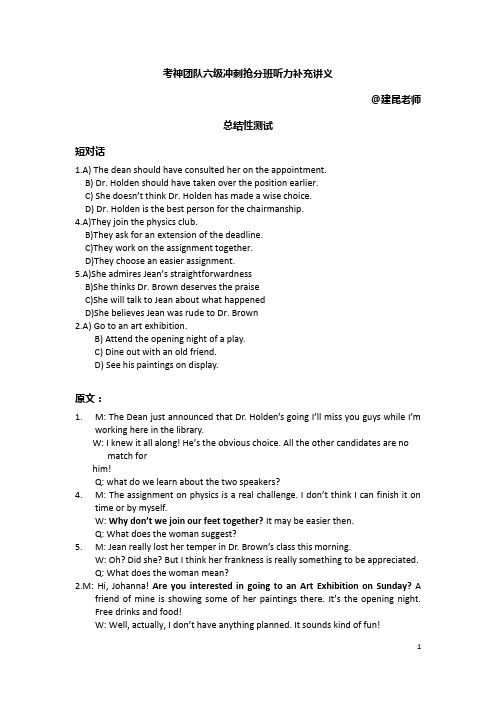
考神团队六级冲刺抢分班听力补充讲义@建昆老师总结性测试短对话1.A) The dean should have consulted her on the appointment.B) Dr. Holden should have taken over the position earlier.C) She doesn’t think Dr. Holden has made a wise choice.D) Dr. Holden is the best person for the chairmanship.4.A)They join the physics club.B)They ask for an extension of the deadline.C)They work on the assignment together.D)They choose an easier assignment.5.A)She admires Jean’s straightforwardnessB)She thinks Dr. Brown deserves the praiseC)She will talk to Jean about what happenedD)She believes Jean was rude to Dr. Brown2.A) Go to an art exhibition.B) Attend the opening night of a play.C) Dine out with an old friend.D) See his paintings on display.原文:1. M: The Dean just announced that Dr. Holden’s going I’ll miss you guys while I’mworking here in the library.W: I knew it all along! He’s the obvious choice. All the ot her candidates are no match forhim!Q: what do we learn about the two speakers?4. M: The assignment on physics is a real challenge. I don’t think I can finish it ontime or by myself.W:Why don’t we join our feet together? It may be easier then.Q: What does the woman suggest?5. M: Jean really lost her temper in Dr. Brown’s class this morning.W: Oh? Did she? But I think her frankness is really something to be appreciated.Q: What does the woman mean?2.M: Hi, Johanna! Are you interested in going to an Art Exhibition on Sunday?Afriend of mine is showing some of her paintings there. It’s the opening night.Free drinks and food!W: Well, actually, I don’t have anything planned. It sounds kind of fun!Q: What did the man invite the woman to do on Sunday?Keys:D C A A长对话19. A) To make a business report to the woman.B) To be interviewed for a job in the woman’s company.C) To resign from his position in the woman’s company.D) To exchange stock market information with the woman.20. A) He is head of a small trading company.B) He works in an international insurance company.C) He leads a team of brokers in a big company.D) He is a public relations officer in a small company.21. A) The woman thinks Mr. Saunders is asking for more than they can offer.B) Mr. Saunders will share one third of the woman’s responsibilities.C) Mr. Saunders believes that he deserves more paid vacations.D) The woman seems to be satisfied with Mr. Saunders’ past experience.原文:W: Please have a seat, Mr. Saunders. I received your job resume last week, and it was very impressed.M: Thank you!W: We are a small financial company trading mostly stocks and bonds may I ask why you are so interested in working for us?M: Your company has an impressive reputation and I’ve always wanted to work for a smaller company.W: That’s good to hear. Would you mind telling me a little bit about your present job?M: I’m currently working in a large international company(Q25B)in charge of a team of 8 brokers(Q25C). We buy and sell stocks for major clients worldwide.W: Why do you think you are the right candidate for this position?M: As a head broker, I have a lot of experiences in the stock market, I deal with the clients on the daily bases, and I enjoy working with people.W: Well, you migh t just be the person we’ve been looking for. Do you have any questions?M: Aha, if I were hired, how many accounts would I be handling?W: you will be working with two other head brokers, in another words, you will be handling about a third of our clients.M: And who would I report to?W: Directly to me.M: I see. What kind of benefits package do you offer?W: Two weeks of paid vacation in your first year employment, you are also been entitled to medical and dental insurance, but this is something you should discuss with our Personnel Department. Do you have any other questions?M: No not at the moment.W: Well, I have to discuss you application with my colleagues and we’ll get back to you early next week.M: OK, thanks, it’s been nice meeting you!W: Nice meeting you too! And thanks for coming in today.19. What’s the purpose of Mr. Saunders’ visit?20. What is Mr. Saunders’ current job?21. What can we conclude from the conversation?Keys: B C D短文:17. A) Because they believe blind students prefer to mix with students who can see.B) Because it would cost lots of money to build such special colleges.C) Because it would constitute discrimination against blind students.D) Because they think blind people should learn to live among sighted people.18. A) By encouraging them to be more self-reliant.B) By showing them proper care and respect.C) By offering them more financial assistance.D) By providing them with free medical service.19. A) Financial aid from the American government.B) Modern technology.C) Professional support.D) Help from the National Federation of the Blind.20. A) Ask American professors to write recommendations on their behalf.B) Obtain American citizenship before they reach the age of 30.C) Turn to special institutions in their own country for assistance.D) Apply to the national federation of the Blind for scholarships.原文:There are about 1 million blind people in the United States. The largest and most influential organization of blind people in this country is the National Federation of the Blind. Its officials say the nation doesn’t have any colleges or universities that serve only blind students. They say the reason for this is that blind people must learn to live among people who can see. American colleges and universities do accept blind and visually impaired students, and they provide services to help thesestudents succeed. For example, colleges find people who write down what the professor say in class and they provide technology that can help blind students with their work. However, experts say colleges can best help blind students by making it clear that the students should learn to help themselves. One blind American student named T recently made news because he graduated from medical school from the University of Wisconsin. He said technology was one of the reasons he succeeded. He used a computer that read into his earphone what he was typing. He also used a small printer that permitted him to write notes about his patients in the hospital. He did his undergraduate work at the University of Notre Dame in South Bend, Indiana. National Federation of the Blind officials say blind students from other nations do come to the United States to attend college. Some can even get financial aid. The Federation awards about 30 scholarships each year that have no citizenship requirement.17. According to officials of the National Federation of the Blind, why are there no special colleges for blind students only?18. According to experts how can colleges best help blind students?19. What is one of the reasons given by T as a blind student for his success?20. What can blind students from overseas do to study in America according to the National Federation of the Blind?Keys:D B A C4124。
英语六级听力技巧讲义:第9讲
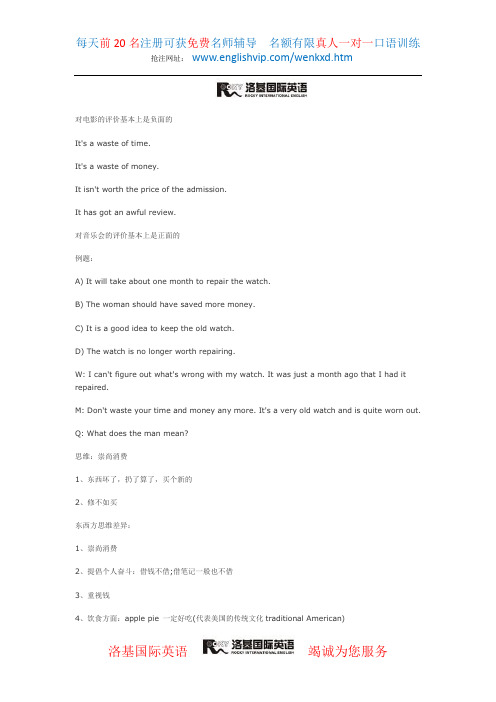
对电影的评价基本上是负面的It's a waste of time.It's a waste of money.It isn't worth the price of the admission.It has got an awful review.对音乐会的评价基本上是正面的例题:A) It will take about one month to repair the watch.B) The woman should have saved more money.C) It is a good idea to keep the old watch.D) The watch is no longer worth repairing.W: I can't figure out what's wrong with my watch. It was just a month ago that I had it repaired.M: Don't waste your time and money any more. It's a very old watch and is quite worn out.Q: What does the man mean?思维:崇尚消费1、东西坏了,扔了算了,买个新的2、修不如买东西方思维差异:1、崇尚消费2、提倡个人奋斗:借钱不借;借笔记一般也不借3、重视钱4、饮食方面:apple pie 一定好吃(代表美国的传统文化traditional American)This picnic is as American as apple pie. 典型的美式野餐。
apple pie virtue 美国的传统美德I took the last one and it was out of the world.Even my mother's can't match this.You wouldn't have to force me to take another helping.5、不谦虚self-confidence6、表达直接且理性,逻辑严紧注:1. figure out 判断出2. worn out (物)破旧;(人)疲惫例题:A) Arguing.B) Protesting.C) Complaining.D) Bargaining.M: Oh, what a morning! You know, I had so much work to do and the phone just kept ringing. Three salespecople called me this morning!W: I know how it is. I get a lot of calls too... even on weekends.Q: What are the two speakers doing?注:I know how it is. 表示同情。
2020年6月六级专项精讲听力讲义(学生版)
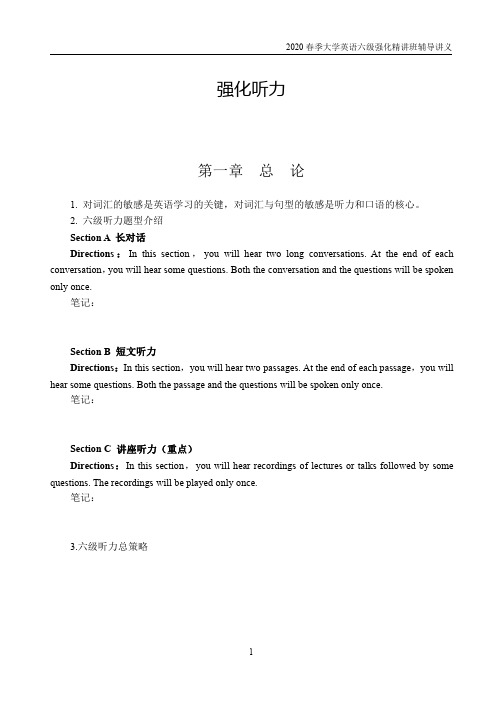
强化听力第一章总论1.对词汇的敏感是英语学习的关键,对词汇与句型的敏感是听力和口语的核心。
2.六级听力题型介绍Section A长对话Directions:In this section,you will hear two long conversations.At the end of each conversation,you will hear some questions.Both the conversation and the questions will be spoken only once.笔记:Section B短文听力Directions:In this section,you will hear two passages.At the end of each passage,you will hear some questions.Both the passage and the questions will be spoken only once.笔记:Section C讲座听力(重点)Directions:In this section,you will hear recordings of lectures or talks followed by some questions.The recordings will be played only once.笔记:3.六级听力总策略第二章讲座听力题型详解第一讲讲座听力题型介绍(大纲样题)Now listen to the following recording and answer questions16to19.1.A)They investigate the retirement homes in America.B)They are on issues facing senior citizens in America.C)They describe the great pleasures of the golden years.D)They are filled with fond memories of his grandparents.(通过17/18/19猜测本题答案)2.A)The loss of the ability to take care of himself.B)The feeling of not being important any more.C)Being unable to find a good retirement home.D)Leaving the home he had lived in for60years.(看原文回顾分析)3.A)The loss of identity and self-worth.B)Fear of being replaced or discarded.C)Freedom from pressure and worldly cares.D)The possession of wealth and high respect.(研究所有选项可以排除其中两个选项)4.A)The urgency of pension reform.B)Medical care for senior citizens.C)Finding meaningful roles for the elderly in society.D)The development of public facilities for senior citizens.(一起回顾最后一段:最后即所得)Moderator:Hello Ladies and Gentleman,it gives me great pleasure to introduce our keynote speaker for today’s session,Dr.Howard ler,Professor of Sociology at Washington University,has written numerous articles and books on the issues facing older Americans in our graying society for the past15years.ler:Thank you for that introduction.Today,I’d like to preface my remarks with a story from my own life which I feel highlights the common concerns that bring us here together.Several years ago when my grandparents were well into their eighties,they were faced with the reality of no longerbeing able to adequately care for themselves.My grandfather spoke of his greatest fear,that of leaving the only home they had known for the past60years.(最后即所得原则)Fighting back the tears,he spoke proudly of the fact that he had built their home from the ground up,and that he had pounded every nail and laid every brick in the process.The prospect of having to sell their home and give up their independence,and move into a retirement home was an extremely painful experience for them.It was,in my grandfather’s own words,like having a limb cut off.He exclaimed in a forceful manner that he felt he wasn’t important anymore.For them and some older Americans,their so-called“golden years”are at times not so pleasant,for this period can mean the decline of not only one’s health but the loss of identity and self-worth.(not only—but also转折后重心原则)In many societies,this self-identity is closely related with our social status,occupation,material possessions,or independence.Furthermore,we often live in societies that value what is“new”or in fashion,and our own usage of words in the English language is often a sign of bad news for older Americans.I mean how would your family react if you came home tonight exclaiming,“Hey,come to the living room and see the OLD black and white TV I brought!”Unfortunately,the word“old”calls to mind images of the need to replace or discard.Now,many of the lectures given at this conference have focused on the issues of pension reform,medical care,and the development of public facilities for senior citizens.And while these are vital issues that must be addressed,I’d like to focus my comments on an important issue that will affect the overall success of the other programs mentioned.This has to do with changing our perspectives on what it means to be a part of this group,and finding meaningful roles the elderly can play and should play in our societies.First of all,I’d like to talk about...1.What does the introduction say about Dr.Howard Miller’s articles and books?(前言部分也出题)2.What is the greatest fear of ler’s grandfather?3.What does ler say the“golden years”can often mean?4.What is the focus of ler’s speech?第二讲讲座听力实战操练第一篇(音频1):通过中心去掉部分选项:16.A)because only in this way can they feel much better in their daily lifeB)because by doing this individuals can recognize their personalitiesC)because by doing so they can focus on acknowledging the stressD)because only in this way can they recover from the stress17.A)to get away from a stressful situation and take part in low stress activityB)to pay no attention to our physical needsC)doing body exercise as much as you canD)to learn to relive yourselves of stress from work18.A)catching up with others in workB)doing some manageable tasks at a proper speedC)doing the whole job within one dayD)trying to slow down instead of speeding upThe first thing that most psychologists suggest is to learn to recognize your own stress signals. We all have different types of stress signals,but individuals should monitor themselves for stress signals,so that they can focus on minimizing or acknowledging the stress before it gets out of control.And common early signs for many people include irritability,insomnia,weight loss or even weight gain,smoking,drinking,increases in small errors,all kinds of things that people get which could be an early signal of stress.You can consider ways to protect yourself when you start seeing these signs coming on.So you might decide to withdraw from a stressful situation or reward yourself with equal amounts of low stress activity time.That’s really the first important way to deal with stress appropriately.The second important way to deal with stress is to pay attention to your body’s demands.Most psychologists are finding that a good exercise program,good nutrition,decreases the amount of stress,or the effect of stress on the body or in the mind.And this seems quite apparent because exercise can provide a stress-free environment away from your usual stresses and it keeps your body busy and preoccupied with non-stressful things.OK,the third thing to reduce stress is to make plans and act when appropriate.What is suggested is that rather than wasting energy on worrying,an individual can direct his or her energy to plan the steps and act.And often,just the planning of the action helps to reduce the stress,because it reduces the worrying.And also the results of the plans or action may serve to remove or weaken the original cause of the stress.Please notice that I just now said“when appropriate”.And this next suggestion has to do with that idea of when appropriate.The third suggestion was to make plans and act when appropriate,rather than just sit around and worry.But the fourth plan,or fourth idea,says to learn to accept situations which are out of your control.These two then go hand in hand.You can make plans and act when it’s appropriate,but when it’s not appropriate,or when it’s impossible,the only way is to learn to accept that some things are unchangeable and out of your hands.So,for example,if you are in traffic,lateness caused by traffic is out of your hands.There’s no sense in getting really crazy about that.If you do so,it only increases your stress to waste energy trying to resist what’s inevitable or what can’t be avoided.The last item that psychologistssuggest is to pace your activities.By“pace”,I mean giving yourself some manageable tasks to do at a reasonable speed.That is,you go at a speed that you can handle,break your task into manageable parts,rather than try to deal with the whole task all at once.So,as an example in your lives as students,a whole term paper might feel overwhelming.But if you say to yourself,today I’m going to the library and gather resources,tomorrow,I’m going to read three articles,and so on,you’ll have broken this one large task,that’s writing a term paper,down into many smaller and more manageable tasks.This will certainly reduce your stress.Ok.Having said all these,I want you to remember that the problem is not in the stressful experiences themselves.We all experience stress and stressful events.The problem is in our reactions to these experiences.And each of us has our own limits for stress and our own ways of coping with stress.So long as we have our own appropriate ways,stress or stressful situations can certainly be dealt with.Ok.That’s all for today’s lecture.See you next week.16.Why should individuals monitor themselves for stress signals?(重复居多正确原则)17.What is the first important way to deal with stress properly?(注意同义替换)18.What does the psychologist mean by“pacing the activities”?(所听所得原则)第二篇(音频2):(201813.51-17.50)Questions16to18are based on the recording you have just heard.16.A)About half of current jobs might be automated.B)The jobs of doctors and lawyers would be threatened.C)The job market is becoming somewhat unpredictable.D)Machine learning would prove disruptive by2013.17.A)They are widely applicable for massive open online courses.B)They are now being used by numerous high school teachers.C)They could read as many as10,000essays in a single minute.D)They could grade high-school essays just like human teacher.18.A)It needs instructions throughout the process.B)It does poorly on frequent,high-volume tasks.C)It has to rely on huge amounts of previous data.D)It is slow when it comes to tracking novel things.Section C Recording One听力原文:Here is my baby niece Sarah.Her mum is a doctor and her dad is a lawyer.By the time Sarah goes to college,the jobs her parents do are going to look dramatically different.In2013,researchers at Oxford University did a study on the future of work.[16]They concluded that almost one in every two jobs has a high risk of being automated by machines.Machine learning is the technology that’s responsible for most of this disruption.It’s the most powerful branch of artificial intelligence.It allows machines to learn from data and copy some of the things that humans can do.My company,Kaggle,operates on the cutting edge of machine learning.We bring together hundreds of thousands of experts to solve important problems for industry and academia.This gives us a unique perspective on what machines can do,what they can’t do and what jobs they might automate or threaten.Machine learning started making its way into industry in the early90s. It started with relatively simple tasks.It started with things like assessing credit risk from loan applications,sorting the mail by reading handwritten zip codes.Over the past few years,we have made dramatic breakthroughs.Machine learning is now capable of far,far more complex tasks.In2012,Kaggle challenged its community to build a program that could grade high-school essays.[17]The winning programs were able to match the grades given by human teachers.Now,given the right data,machines are going to outperform humans at tasks like this.A teacher might read10,000essays over a40-year career.A machine can read millions of essays within minutes.We have no chance of competing against machines on frequent high-volume tasks,but there are things we can do that machines cannot.Where machines have made very little progress is in tackling novel situations.Machines can’t handle things they haven’t seen many times before.[18]The fundamental limitation of machine learning is that it needs to learn from large volumes of past data.But humans don’t.We have the ability to connect seemingly different threads to solve problems we’ve never seen before.16.What did the researchers at Oxford University conclude?17.What do we learn about Kaggle company’s winning programs?18.What is the fundamental limitation on machine learning?第三篇(音频3)Questions19to21are based on the recording you have just heard.(注意:当很难听懂时,根据已知中心猜测答案)19.A)The engineering problems with solar power.B)The generation of steam with the latest technology.C)The importance of exploring new energy sources.D)The theoretical aspects of sustainable energy.20.A)Drive trains with solar energy.B)Upgrade the city’s train facilities.C)Build a new ten-kilometer railway line.D)Cut down the city’s energy consumption.21.A)Build a tank for keeping calcium oxide.B)Find a new material for storing energy.C)Recover super-heated steam.D)Collect carbon dioxide gas.Recording Two听力原文:We’ve talked recently about the importance of sustainable energy.[19]We’ve also talked about the different theories on how that can be done.So far,our discussions have all been theoretical.Now I have a practical question for you all.Can you run a140,000-kilogram train on just the steam generated by solar power?Well,one engineer,Tim Kasselman,believes it’s possible. And his home city of Sacramento,California should see the technology’s first test.As part of the upgrading of its rail yard,Kasselman,who is an inventor and self-proclaimed“steam visionary’’,is campaigning for a new steam train that runs without any fire and could run on an existing ten-kilometer line,driving tourists and perhaps offering city commuters a green alternative to their cars.[20]Kasselman wants to build an array of solar magnifying mirrors at one end of the line to collect and focus heat onto water-filled tubes.This would generate steam that could be used to fill tanks on a small steam train without the use of fire.“Supplying power to trains in this way would offer the shortest distance from well to wheels,”he says,“with the least amount of energy lost.”According to Harry Vallentine,a Canadian engineer who is researching modem steam technology,a special tank measuring2by10metres could store over750kilowatt hours of energy as high pressure steam,enough to pull a two-cart train for an hour or so.Energy to drive a steam locomotive can be stored in other materials besides water.[21]For example,a team at Tohoku University in Japan has studied materials that can store large amounts of heat.When heated,these materials turn from a solid into a liquid,absorbing energy as they change phase.The liquid is maintained above its melting point until steam is required,at which point the liquid is allowed to turn back into a solid,releasing its stored energy.Another team at Nagoya University in Japan has tested calcium compound as an energy storage material.Heating this chemical compound drives off carbon dioxide gas,leaving calcium oxide.The gas can be stored under pressure in a tank.To recover the energy,the gas is fed back over the calcium oxide.“In theory,’’says Vallentine,“this can create a high enough temperature to generate super-heated steam.”19.What has the speaker previously talked about?20.What is Tim Kasselman trying to do in Sacramento?21.What has a Japanese research team tried to do?第四篇(音频4)Questions22to25are based on the recording you have just heard.22.A)The lack of supervision by both the nation and local government.B)The impact of the current economic crisis at home and abroad.C)The poor management of day centers and home help services.D)The poor relation between national health and social care services.23.A)It was mainly provided by voluntary services.B)It mainly caters to the need of the privileged.C)It called for a sufficient number of volunteers.D)It has deteriorated over the past sixty years.24.A)Their longer lifespans.B)Fewer home helpers available.C)Their preference for private services.D)More of them suffering serious illness.25.A)They are unable to pay for health services.B)They have long been discriminated against.C)They are vulnerable to illness and diseases.D)They have contributed a great deal to society.Recording Three听力原文:Today’s crisis in care for older people in England has two main causes.First,people are living longer with a lot more complex needs.[22]Second,they rely on a system that has long been marked by a poor relation between national health and social care services.Current services originate in two key measures.They are the National Health Service and the 1948National Assistance Act.This required local governments to provide residential accommodation for older people and supervise care homes run by independent organizations.They also provided home and community services including meals,day centers and home helpers and other subsidized services.The National Health Service was free and wholly publicly provided.It delivered the best health care for all.No such vision guided residential and community care though.[23]The care was substantially provided by voluntary services,which worked together with local authorities as they long had with eligibility based on income.Today,life expectancy has risen from66for a male at birth in1948to around80now.In addition,there is better overall health and improved medical knowledge and care.This means an unprecedentednumber of people are surviving longer in conditions requiring expert support.Families provide at least as much care as they ever did.Even so,they can rarely without subsidized support address serious personal needs.Care for older people faced persistent criticism as these trends became apparent.From the early1960s,local authorities were required to plan health and welfare services. The aim was to enable older people to remain in their own homes for as long as possible,but this increased concern about the lack of coordination between free health and paid-for social care. Through the1970s,a number of measures sought to improve matters.However,at a time of financial crisis,funding diminished and little changed.[24]In the1980s,the government cut spending.Meanwhile,preference for private over public services made management even more difficult.Simultaneously,the number of sick older people ernments emphasized the need to improve services.They did so though while doing little to stop the erosion of available aid. Services were irregular across authorities.Unless you were prepared to pay,they were increasingly difficult to obtain for any but the most severely disabled.Why has60years of criticism produced so little change?[25]Discrimination against older people has a long history.Additionally,those affected by inadequate health and social care are too vulnerable to launch the protests that have addressed other forms of discrimination.22.What is one cause of the current crisis in care for the elderly in England?23.What does the speaker say about residential and community care?24.What made management of care for the elderly more difficult in the1980s?25.What does the speaker say about older people in England?第三章长对话总策略:真题演练第一篇:(音频5:0-3.45秒)Questions1to4are based on the conversation you have just heard.1.A)It can benefit professionals and non-professionals alike.B)It lists the various challenges physicists are confronting.C)It describes how some mysteries of physics were solved.D)It is one of the most fascinating physics books ever written.2.A)Physicists’contribution to humanity.B)Stories about some female physicists.C)Historical evolution of modem physics.D)Women‘s changing attitudes to physics.3.A)By exposing a lot of myths in physics.B)By describing her own life experiences.C)By including lots of fascinating knowledge.D)By telling anecdotes about famous professors.4.A)It avoids detailing abstract concepts of physics.B)It contains a lot of thought-provoking questions.C)It demonstrates how they can become physicists.D)It provides experiments they can do themselves.听力原文:M:Hey,I just read a great book about physics.I think you’d like it.It’s called The Physics of the World.It’s written by a scientist named Sylvia Mendez.W:Oh,I read that book.It was great.The writer is a warm and competent guide to the mysteries of physics.[1]I think it promises enrichment for any reader from those who know little about science to the career physicist.M:And it’s refreshing to see a strong,curious,clever woman adding her voice to the scientific discourse and a field that has been traditionally dominated by man.[2]I think she is to be commended for making an effort to include anecdotes about little known female scientists.You know,they were often victims of a generation firmly convinced that the woman’s place was in the home.W:[3]I like how the book is clearly written with each chapter brought to life by pieces of fascinating knowledge.For example,in one chapter she exposes a myth that I’ve heard taught by university physics professors.I’ve often heard that medieval glass windows are thicker at the bottom because glass flows like a fluid.This,she shows,is not true.The distortion is actually thanks to a peculiarity of the glassmakers’process.M:[4]Yeah,I like how she cultivates scientific engagement by providing a host of“Do It Yourself’experiments that bring the same foundational principles of classical physics that govern everything from the solar system to your kitchen table,from using complex laws of physics to test whether a spinning egg is cooked to measuring atmospheric pressure by lifting a piece of cardboard. Her hands-on examples make her book a truly interactive read.W:Yes,I must say this equation-free book is an ideal read for scientists of all stripes,anyone teaching science and even people who dislike physics.1.What does the woman say about the book the man recommended?2.What can we find in the book the man recom-mended?3.How does the author bring her book to life?4.How does the book cultivate readers’interest in physics?真题演练第二篇(音频6:3.45-7分0秒)Questions5to8are based on the conversation you have just heard.5.A)He is too busy to finish his assignment in time.B)He does not know what kind of topic to write on.C)He does not understand the professor’s instructions.D)He has no idea how to proceed with his dissertation.6.A)It is too broad.B)It is outdated.C)It is challenging.D)It is interesting.7.A)Biography.B)Nature.C)Photography.D)Beauty.8.A)Improve his cumulative grade.B)Develop his reading ability.C)Stick to the topic assigned.D)List the parameters first.听力原文:M:Hi,professor.I was hoping I could have a moment of your time if you’re not too busy.[5] I’m having some problems getting started on my dissertation and I was hoping you could give me some advice on how to begin.W:Sure,I have quite a few students though.So can you remind me what your topic is?M:The general topic I chose is aesthetics,but that’s as far as I’ve got.I don’t really know where to go from there.W:Yeah,[6]that’s much too large a topic.You really need to narrow it down in order to make it more accessible.Otherwise,you’ll be writing a book.M:Exactly.That’s what I wanted to ask you about.I was hoping it would be possible for me to change topics.[7]I’m really more interested in nature than beauty.W:[8]I’m afraid you have to adhere to the assigned topic.Still,if you’re interested in nature,then that certainly can be worked into your dissertation.We’ve talked about Hume before in class,right?M:Oh,yeah,he’s the philosopher who wrote about where our ideas of beauty come from.W:Exactly.I suggest you go to the library and get a copy of his biography.Start from there,but remember to stick to the parameters of the assignment.This paper is a large part of your cumulative grade,so make sure to follow the instructions.If you take a look at his biography,you can get a good idea of how his life experiences manifest themselves in his theories of beauty,specifically,the way he looked towards nature as the origin of what we find beautiful.M:Great.Thanks for taking the time to answer my questions,professor.I’ll let you get back to class now.W:If there’s anything else you need,please come see me in my office any time.5.What is the man’s problem?6.What does the professor think of the man’s topic?7.What is the man really more interested in?8.What does the professor say the man has to do?真题练习第四篇(音频7)19.A)A notice by the electricity boardB)Ads promoting electric appliancesC)The description of a thief in disguiseD)A new policy on pensioners’welfare总结:20.A)Speaking with a proper accentB)Wearing an official uniformC)Making friends with themD)Showing them his ID总结:21.A)To be on the alert when being followedB)Not to leave senior citizens alone at homeC)Not to let anyone in without an appointmentD)To watch out for those from the electricity board总结:22.A)She was robbed near the parking lotB)All her money in the bank disappearedC)The pension she had just drawn was stolenD)She was knocked down in the post office总结:19.what does the woman want the man to read in the newspaper?20.How did the man mentioned in the newspaper try to win further trust from the victims?21.what is the warning form the police?22.what does the woman speaker tell us about the old lady第四章短文听力短文总策略:真题演练第一篇(音频8;2018.7分-10分22)Questions9to11are based on the passage you have just heard.9.A)The unprecedented high temperature in Greenland.B)The collapse of ice on the northern tip of Greenland.C)The unusual cold spell in the Arctic area in October.D)The rapid change of Arctic temperature within a day.10.A)It has created a totally new climate pattern.B)It will pose a serious threat to many species.C)It typically appears about once every ten years.D)It has puzzled the climate scientists for decades.11.A)Extinction of Arctic wildlife.B)Ice less summers in the Arctic.C)Emigration of indigenous people.D)Better understanding of ecosystems.During the Arctic winter from October to March,the average temperature in the frozen north typically hovers around minus20degrees Celsius.But this year,the Arctic is experiencing much higher temperatures.[9]On February20,temperature in Greenland climbed above freezing or zero degree Celsius and it stayed there for over24hours.Then on February24,the temperature on Greenland’s northern tip reached six degrees Celsius.Climate scientists describe the phenomenon as stunning.[10]Weather conditions that drive this bizarre temperature surge have visited the Arctic before. They typically appear about once in a decade.However,the last such increase in temperature took place two years ago.This is troubling as climbing Arctic temperatures combined with rapid sea ice loss are creating a new type of climate feedback loop,which could accelerate Arctic warming.Indeed,sea ice cover in the Arctic is melting faster than expected.Without those masses of cooling sea ice,warm air brought to the Arctic can penetrate further inland than it ever did before. The air can stay warmer,longer too.This drives additional melting.Overall,earth is warming at a rapid pace.2014through2017rank as the hottest years on record and the Arctic is warming twice as fast as any place else on earth.This raises unique challenges for Arctic wildlife and indigenous people,who depend on Arctic ecosystems to survive. Previously,climate forecasts predicted that Arctic summer ice would disappear entirely by around 2060,[11]but based on what scientists are seeing now,the Arctic may be facing summers without ice within20years.9.What did climate scientists describe as stunning?10.What does the passage say about the temperature surge in the Arctic?11.What may occur in20years according to scientists’recent observations?真题演练第二篇(音频9.7分-10分22)Questions12to15are based on the passage you have just heard.12.A)A good start.B)A detailed plan.C)A strong determination.D)A scientific approach.13.A)Most people get energized after a sufficient rest.B)Most people tend to have finite source of energy.C)It is vital to take breaks between demanding mental tasks.D)It is most important to have confidence in one’s willpower.14.A)They could keep on working longer.B)They could do more challenging tasks.C)They found it easier to focus on work at hand.D)They held more positive attitudes toward life.15.A)They are part of their nature.B)They are subject to change.C)They are related to culture.D)They are beyond control.听力原文:[12]A good dose of willpower is often necessary to see any task through,whether it,s sticking to a spending plan or finishing a great novel.And if you want to increase that willpower,a new study suggests,you just simply have to believe you have it.[13]According to the study,what matters most is what we think about our willpower.If we believe it’s a finite resource,we act that。
何凯文四六级讲义二

讲义说明1、配套课程能在一小时提高60分的文都四六级冲刺讲座,巨牛!!!2、主讲师资——文都名师何凯文北京外国语大学英语专业博士,美国芝加哥访问学者,资深考研、英语四六级培训名师,阅卷组成员。
深谙命题规律和解题套路,对英语的学习规律和方法见解独特。
带给学生的不只是考分的提高,更多的是对英语领悟和感知的突破。
纯正的美语、独到的见解、睿智的思维和轻松幽默的语言,为其赢得了广大学生的认同和喜爱。
主讲:阅读理解、写作、翻译。
4、讲义:7页(电子版)文都网校2011年5月31日2011年文都大学英语四六级冲刺讲义一.Listening Comprehension:Part 1 .Short Conversation几种思维1.主题思维:上文提到一件事情(用一般疑问句进行提问),这就是对话主题。
下文是肯定或者是否定的回答。
掌握肯定和否定的表达方法。
2.否定思维:评价性否定;事实性否定;邀请性否定3.听到什么不选什么的思维:安全感的获得例题:Eg1. A) Taking photographs .B) Enhancing images.C) Mending cameras. D) Painting pictures.听力原文:W: Do you let people know when you're taking pictures of them?M: I try not to. You know any picture of a person who poses for the camera would lookdull and unnatural.Q: What are the speakers talking about?Eg2 . A) Get some small change. B) Find a shopping center.C) Cash a check at a bank. D) Find a parking meter.听力原文:M: Excuse me, do you have change for a ten-dollar note? I need to pay the parking meter.W: I'm sorry, but I think you can get it through the money changer in the shopping centeracross the street.Q: What is the man trying to do?Eg3 .A) Shopping with his son. B) Buying a gift for a child.C) Promoting a new product. D) Bargaining with a salesgirl.听力原文:M: Can you recommend something that a school boy of 7 or 8 will really like?W: I'd suggest this toy train, sir. It's an excellent brand, very popular all over the worldthese days.Q: What is the man doing?Eg4. A) He moved to Baltimore when he was young.B) He can provide little useful information.C) He will show the woman around Baltimore.D) He will ask someone else to help the woman.听力原文W: I need to talk to someone w ho knows Baltimore well. I'm told you lived there.M: Oh, but I was really young at the time.Q: What does the man mean?Eg5. A) He is rather disappointed. B) He is highly ambitious.C) He can’t face up to the situation. D) He knows his own limitations.15.W: Aren't you disappointed that you didn't get the promotion?M: Maybe a little, but I know I need more experience before I'm ready for that kind of responsibility.Q: What do we learn about the man from this conversation?Eg6. A) She bought a new set of furniture from Italy last month.B) She sold all her furniture before she moved house.C) She plans to put all her old furniture in the basement.D) She still keeps some old furniture in her new house.听力原文:M: Did you really give away all your furniture when you moved into the new house last month?W: Just the useless pieces, as I’m planning to purchase a new set from Italy for the sitting room only. Q: What does the woman mean?Eg7.A) He has got a heart attack. B) He was badly hurt.C) He was unharmed. D) He has fully recovered from the shock.听力原文:W: Were you hurt in the accident?M: I was shocked at the time, but wasn't hurt at all. My bike was totally damaged though.Q: What do we know about the man?Eg8. A) John Smith isn't in right now.B) John Smith can't come to the phone right now.C) John Smith doesn't want to speak to the caller.D) The caller dialed the wrong number.Part 2.long conversation一、抓住首尾句【预览选项】[A] To go sightseeing.[B] To have meetings.[C] To promote a new champagne.[D] To join in a training program.【边听边选】M: Hi, Ann, welcome back. How’s your trip to the states?W: Very busy, [19]I had a lot of meetings. …19. Why did the woman go to New York?二、留意对话中的一问一答【预览选项】[A] Data collection.[B] Training consultancy.[C] Corporate management.[D] Information processing.【边听边选】W: What’s your line of business, Mr. Johnson?M: We are a training consultancy.25. What is the man’s line of business?Part 3.Passages【预览选项】29. A) Michael’s parents got divorced. B) Karen was adopted by Ray Anderson.C) Karen’s mother died in a car accident .D) A truck driver lost his life in a collision.【边听边选】The impact of the collision killed Karen’s mother instantly, but she was left trapped in the burning car.【预览选项】A) Kevin is nine years old B) Kevin is handsomeC) Kevin is single D) Kevin is lack of efficiency【边听边选】二.Fast reading:考察能力:定位能力;答案特征:原文重现和同意替换;尽量用原文回答:1.German chemicals giant BASF saves £200 million a year by ___________.A) recycling heat and energy B) setting up factories in ChinaC) using the newest technology D) reducing the CO2 emissions of its plantsAt the BASF, such recycling of heat and energy saves the company £200 million a year and almost half its CO2 emissions.2.How much of the power consumed by incandescent bulbs is converted into light?A) A small portion. B) Some 40 percent.C) Almost half. D) 75 to 80 percent.Lighting eats up 20 percent of the world’s electricity, or the equivalent of roughly 600,000 tons of coal a day. Forty percent of that powers old-fashioned incandescent light bulbs—a 19th-century technology that wastes most of the power it consumes on unwanted heat.3. The strongest incentives for energy conservation will derive from __________The most powerful incentives, of course, will come from the market itself. 三.Writing:内容;结构;语言;内容预测:参见何凯文博客:或QQ空间:576728297新浪微博:何凯文结构预测:两种结构的文章:正反观点对立型和社会热点型文章;语言预测:常见句型表达;开头句式背景句:1.There is no consensus of opinions among people as to …some people tend to have a favorable attitude toward…While, others have an unpleasant association with…2. Recently, the issue of ...... has been brought into public focus.近来,_______的问题引起了社会的广泛关注。
1207建昆老师六级冲刺班听力PPT课件

4
六级听力结构
1-8 短对话
9-15 长对话 16-25 短文听力
26-35 听写
8%
7% 菜鸟得分 10% 良机
10%
5
六级听力三大破题规律
1、视听一致 (适用于长对话+短文听力) 2、同意替换 (适用于短/长对话+短文听力) 3、单词威胁 (适用于听写)
6
六级听力三大破题规律
1、视听一致 (适用于长对话+短文听力) 经典提分规律 不适于短对话 边听边选
匹配题
(10%)
仔细阅读 (20%)
汉译英
(15%)
第二次收卷 (答题卡2)
2
推荐做题顺序
1、写作听力(60m) 2、精读 (25m) 3、翻译 (25m) 4、匹配 (15m) 5、选词 (5m)
3
六级听力结构
1-8 短对话
9-15 长对话 16-25 短文听力
26-35 听写
8%
7% 10%
44
六级听写 步骤:2+1 (最后一遍开始誊写) 考点:语法类+发音类
45
六级听写
听写
考点:语法类+发音类
46
六级听写
听写-语法类历史考点题目
1、名词或动词以“y”结尾
辅音+y ,y 变为i+es / ed
元音+y , 正常变化即可
imply-implied
essay-essays
47
六级听写
14
六级短对话规律梳理 短对话
1、看题? 2、做题?
15
六级短对话规律梳理
1、看题?
短对话
[A] Mark is not fit to take charge of the Student Union.
六级听力讲义
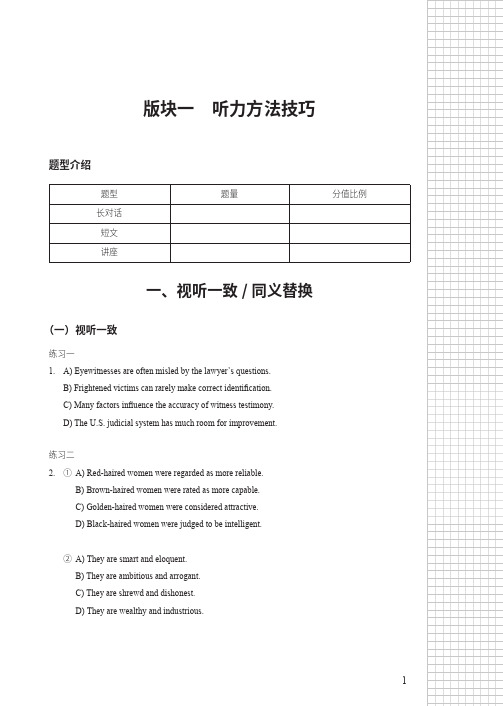
练习二 3. A) The restructuring of her company.
B) The man’s switch to a new career. C) The updating of technology at Cucin Tech. D) The project the man managed at Cucin Tech.
4. A) Talented personnel. B) Effective promotion.
C) Strategic innovation. D) Competitive products.
4
版块一 听力方法技巧
5. A) ቤተ መጻሕፍቲ ባይዱnnovate constantly. B) Expand the market.
6. A) By reflecting on Americans’ previous failures in predicting earthquakes. B) By noting where the most severe earthquake in U. S. history occurred. C) By describing the destructive power of earthquakes. D) By explaining some essential geological principles.
练习三 8. A) The importance of language proficiency.
B) The job of an interpreter. C) The stress felt by professionals. D) The best way to effective communication.
英语六级听力技巧讲义:第8讲
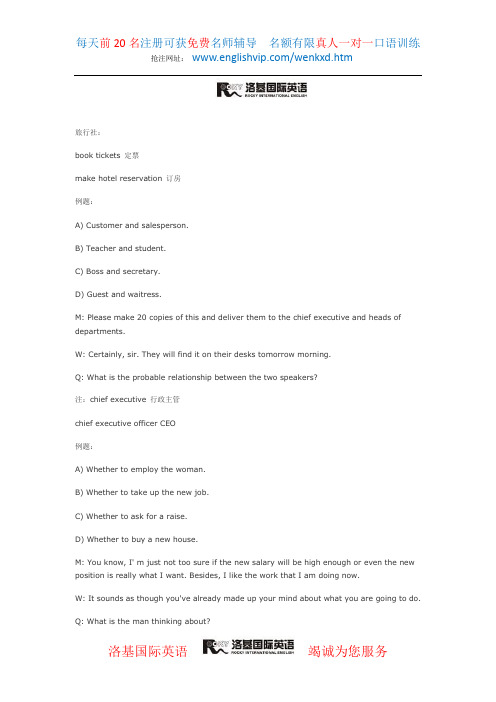
旅行社:book tickets 定票make hotel reservation 订房例题:A) Customer and salesperson.B) Teacher and student.C) Boss and secretary.D) Guest and waitress.M: Please make 20 copies of this and deliver them to the chief executive and heads of departments.W: Certainly, sir. They will find it on their desks tomorrow morning.Q: What is the probable relationship between the two speakers?注:chief executive 行政主管chief executive officer CEO例题:A) Whether to employ the woman.B) Whether to take up the new job.C) Whether to ask for a raise.D) Whether to buy a new house.M: You know, I' m just not too sure if the new salary will be high enough or even the new position is really what I want. Besides, I like the work that I am doing now.W: It sounds as though you've already made up your mind about what you are going to do.Q: What is the man thinking about?注:take up 选课(take, take up, enroll in, register for, sign up for);接受(take)例题:A) A teacher.B) A psychologist.C) A librarian.D) A publisher.W: I'm looking for a textbook for my Psychology course. It's called " Introduction to Educational Psychology" . Do you have it?M: Yes, we do. You'll find it in Section 24 on the top shelf.Q: What's the man's occupation?注:1. textbook 教科书2. introduction 初级课程3. shelf 书架图书馆:reference room 参考资料室periodical's room 期刊室current issue 当月期刊older issue 过期期刊back issue 过期期刊card catalog 索引室,卡片检索put on reserve 预留关于图书馆基本思路:1、想借的书借不到。
《六级听力技巧》课件

遇到困难时的解决策略
保持冷静 多练习 寻求帮助
当遇到难以理解的听力材料时,保持冷静并继续 聆听,尽量通过上下文推测出正确的答案。
多进行听力练习,针对性地提升自己在不同场景 下的听力技巧,逐渐克服困难。
如果实在无法理解听力材料,可以向老师、同学 或在线资源寻求帮助,共同解决问题。
总结与建议
技巧是关键
识别关键词
注意听到的关键词,比如人名、 地点或数字,这些关键词有助 于准确理解听力内容。
记笔记
在听力材料播放过程中,记下 关键信息,方便后续的回答问 题。
提升听力技巧的练习方法
1
切换听力材料
尝试不同类型的听力材料,如新闻、讲座和对话,以提高听力技巧的适应能力。
2
定期模拟考试
模拟真实的考试场景,设置时限并进行答题。通过训练来提高听力技巧和应对压 力的能力。 Nhomakorabea3
寻找听力资源
寻找外语广播、电视节目和在线课程,扩展听力素材库,并从中学习新的听力技 巧。
典型听力场景与技巧
讲座
在讲座中,要注意讲者的语速和 重点,同时关注关键词和上下文 线索。
小组讨论
在小组讨论中,要学会倾听他人 的观点,同时积极参与,并提出 自己的见解。
广播节目
在收听广播节目时,要注意电台 主持人的语音语调和播报风格, 以帮助理解节目内容。
掌握六级听力技巧是取得高 分的关键,需要通过不断的 练习来提升。
多样化的练习
尝试不同类型的听力练习, 从而适应各种场景和听力材 料。
相信自己
相信自己的能力,保持积极 的心态,相信通过努力可以 提高听力水平。
《六级听力技巧》PPT课 件
在这个PPT课件中,我将与大家分享六级听力技巧。通过本课程,你会了解到 听力技巧的重要性,提高听力技巧的方法,以及在不同听力场景中应用的技 巧。
菜鸟课程六级强化听力技巧讲义 (1)
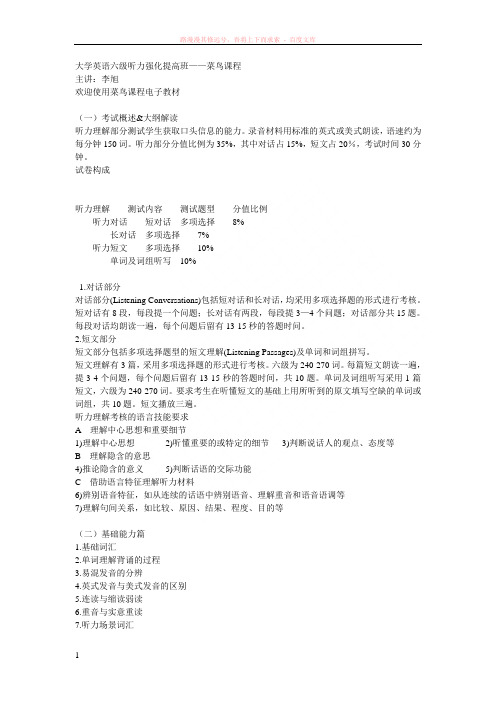
大学英语六级听力强化提高班——菜鸟课程主讲:李旭欢迎使用菜鸟课程电子教材(一)考试概述&大纲解读听力理解部分测试学生获取口头信息的能力。
录音材料用标准的英式或美式朗读,语速约为每分钟150词。
听力部分分值比例为35%,其中对话占15%,短文占20%,考试时间30分钟。
试卷构成听力理解测试内容测试题型分值比例听力对话短对话多项选择8%长对话多项选择7%听力短文多项选择10%单词及词组听写10%1.对话部分对话部分(Listening Conversations)包括短对话和长对话,均采用多项选择题的形式进行考核。
短对话有8段,每段提一个问题;长对话有两段,每段提3—4个问题;对话部分共15题。
每段对话均朗读一遍,每个问题后留有13-15秒的答题时问。
2.短文部分短文部分包括多项选择题型的短文理解(Listening Passages)及单词和词组拼写。
短文理解有3篇,采用多项选择题的形式进行考核。
六级为240-270词。
每篇短文朗读一遍,提3-4个问题,每个问题后留有13-15秒的答题时间,共10题。
单词及词组听写采用1篇短文,六级为240-270词。
要求考生在听懂短文的基础上用所听到的原文填写空缺的单词或词组,共10题。
短文播放三遍。
听力理解考核的语言技能要求A理解中心思想和重要细节1)理解中心思想2)听懂重要的或特定的细节3)判断说话人的观点、态度等B理解隐含的意思4)推论隐含的意义5)判断话语的交际功能C借助语言特征理解听力材料6)辨别语音特征,如从连续的话语中辨别语音、理解重音和语音语调等7)理解句间关系,如比较、原因、结果、程度、目的等(二)基础能力篇1.基础词汇2.单词理解背诵的过程3.易混发音的分辨4.英式发音与美式发音的区别5.连读与缩读弱读6.重音与实意重读7.听力场景词汇1. 基础词汇大学英语6级考试要求考试掌握大约5500词,但听力部分的实际考查词汇量要低于4000,其考查重点是测试考生获取口头信息的能力。
大学英语六级考试听力讲义精选(四)
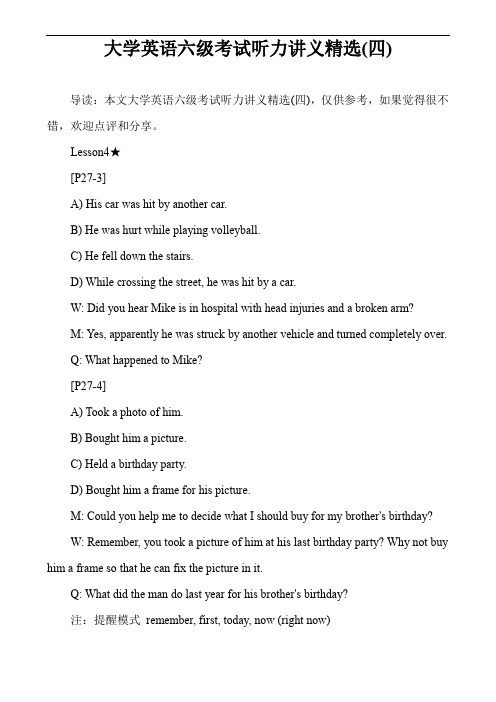
大学英语六级考试听力讲义精选(四)导读:本文大学英语六级考试听力讲义精选(四),仅供参考,如果觉得很不错,欢迎点评和分享。
Lesson4★[P27-3]A) His car was hit by another car.B) He was hurt while playing volleyball.C) He fell down the stairs.D) While crossing the street, he was hit by a car.W: Did you hear Mike is in hospital with head injuries and a broken arm?M: Yes, apparently he was struck by another vehicle and turned completely over.Q: What happened to Mike?[P27-4]A) Took a photo of him.B) Bought him a picture.C) Held a birthday party.D) Bought him a frame for his picture.M: Could you help me to decide what I should buy for my brother's birthday?W: Remember, you took a picture of him at his last birthday party? Why not buy him a frame so that he can fix the picture in it.Q: What did the man do last year for his brother's birthday?注:提醒模式remember, first, today, now (right now)[P31-5]A) Women's rights in society.B) The woman's job is a librarian.C) An important election.D) Career planning.W: We all talk about how liberated we are, but in fact women are still not equally treated.M: I don't think so. You've got the vote, you've got your careers-I think you've got everything important.Q: What are they arguing about?注:liberated 自由的,被解放了的free 免费的(选项中反义替换pay),有空闲时间的(选项中反义替换busy)。
六级听力讲义讲解

Short-handed
I will take care of it right now.
Your meal will be free.
2. 图书馆场景
图书馆设施:
shelf书架 stack书库 reading room 阅览室 reference room参考书阅览室
periodical room期刊阅览室 copier复印机 study lounge 自习室 circulation desk 流通台
医生看病: operation, surgery, prescribe some medicines, run a fever, have a running nose, nose congestion, take the temperature, sore throat, cough, pills, tablets, loose bowels, headache
alcohol 酒精
coffee 咖啡
a cup of coffee
动作: order dishes 点菜 bring me the menu 看菜单 recommendation 推荐,招牌菜 付账: 我有钱我请客。Let me treat you. It's my treat. 我来买单。I will check out. pick up the bill.
(顿悟原理)
听力习惯
听力坏习惯:
• 晚上听着入眠 • 闭眼
听力的正确习惯:
• 最好的时间留给听力 • 利用选项作笔记
主题场景归纳
体育运动: exercise, tennis ball, football, tournament, fan
六级听力技巧讲义
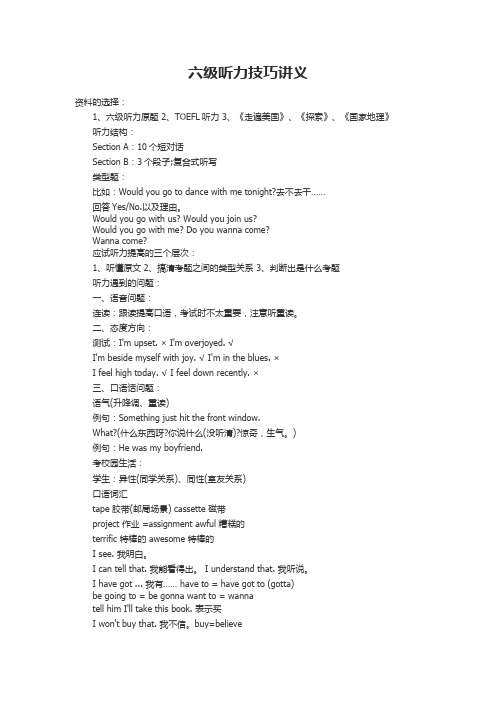
六级听力技巧讲义资料的选择:1、六级听力原题2、TOEFL听力3、《走遍美国》、《探索》、《国家地理》听力结构:Section A:10个短对话Section B:3个段子;复合式听写类型题:比如:Would you go to dance with me tonight?去不去干……回答Yes/No.以及理由。
Would you go with us? Would you join us?Would you go with me? Do you wanna come?Wanna come?应试听力提高的三个层次:1、听懂原文2、搞清考题之间的类型关系3、判断出是什么考题听力遇到的问题:一、语音问题:连读:跟读提高口语,考试时不太重要,注意听重读。
二、态度方向:测试:I'm upset. × I'm overjoyed. √I'm beside myself with joy. √ I'm in the blues. ×I feel high today. √ I feel down recently. ×三、口语话问题:语气(升降调、重读)例句:Something just hit the front window.What?(什么东西呀?你说什么(没听清)?惊奇,生气。
)例句:He was my boyfriend.考校园生活:学生:异性(同学关系)、同性(室友关系)口语词汇tape 胶带(邮局场景) cassette 磁带project 作业 =assignment awful 糟糕的terrific 特棒的 awesome 特棒的I see. 我明白。
I can tell that. 我能看得出。
I understand that. 我听说。
I have got ... 我有…… have to = have got to (gotta)be going to = be gonna want to = wannatell him I'll take this book. 表示买I won't buy that. 我不信。
英语六级听力备考讲义和笔记
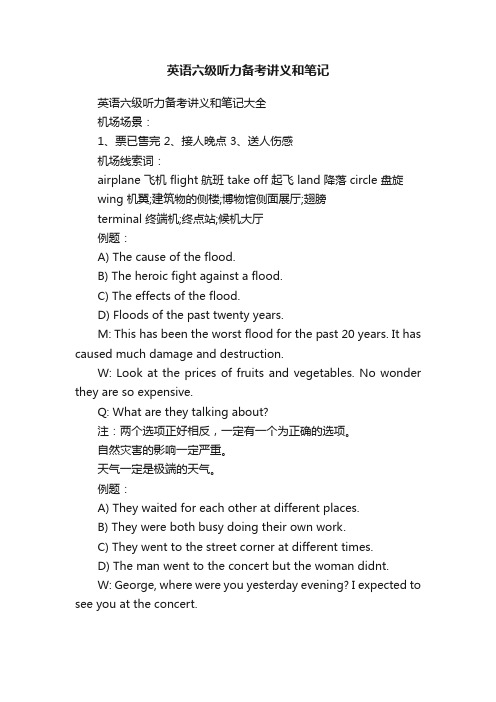
英语六级听力备考讲义和笔记英语六级听力备考讲义和笔记大全机场场景:1、票已售完2、接人晚点3、送人伤感机场线索词:airplane 飞机 flight 航班 take off 起飞 land 降落 circle 盘旋wing 机翼;建筑物的侧楼;博物馆侧面展厅;翅膀terminal 终端机;终点站;候机大厅例题:A) The cause of the flood.B) The heroic fight against a flood.C) The effects of the flood.D) Floods of the past twenty years.M: This has been the worst flood for the past 20 years. It has caused much damage and destruction.W: Look at the prices of fruits and vegetables. No wonder they are so expensive.Q: What are they talking about?注:两个选项正好相反,一定有一个为正确的选项。
自然灾害的影响一定严重。
天气一定是极端的天气。
例题:A) They waited for each other at different places.B) They were both busy doing their own work.C) They went to the street corner at different times.D) The man went to the concert but the woman didnt.W: George, where were you yesterday evening? I expected to see you at the concert.。
大学英语六级听力考试讲义与笔记(3)
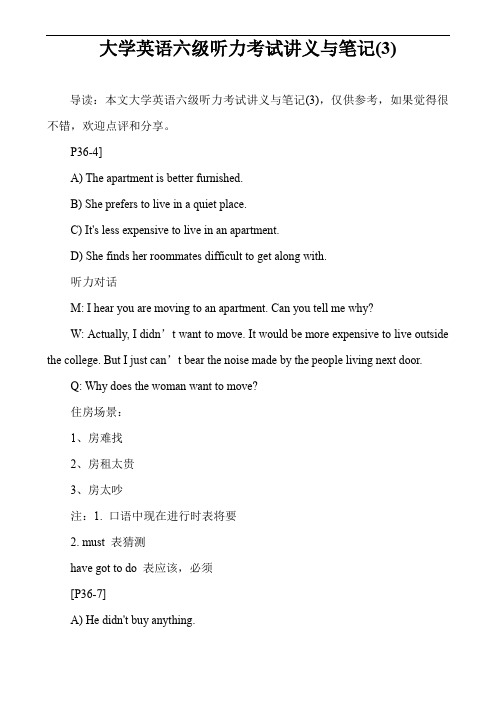
大学英语六级听力考试讲义与笔记(3)导读:本文大学英语六级听力考试讲义与笔记(3),仅供参考,如果觉得很不错,欢迎点评和分享。
P36-4]A) The apartment is better furnished.B) She prefers to live in a quiet place.C) It's less expensive to live in an apartment.D) She finds her roommates difficult to get along with.听力对话M: I hear you are moving to an apartment. Can you tell me why?W: Actually, I didn’t want to move. It would be more expensive to live outside the college. But I just can’t bear the noise made by the people living next door.Q: Why does the woman want to move?住房场景:1、房难找2、房租太贵3、房太吵注:1. 口语中现在进行时表将要2. must 表猜测have got to do 表应该,必须[P36-7]A) He didn't buy anything.B) He got some medicine for his foot.C) He was sick and couldn't go shopping.D) He bought everything except the football.听力对话W: Did you go shopping this afternoon?M: Yes, but all I got was a sore foot.Q: What does the man mean?注:sore foot 脚疼sore throat 嗓子疼[P36-9]A) She didn't know her daughter could sing so well.B) She sings better than her daughter.C) She doesn't like her daughter.D) She herself doesn't have a good voice.听力对话M: I heard your daughter sing at the school concert last night. She has a lovely voice, I must say.W: Thank you, but I don’t know where she gets it.Q: What does the woman probably mean?[P36-10]A) He finds history books difficult to understand.B) He has to read a lot of history books.C) He doesn't like the history course.D) He has lost his history book.听力对话W: Why are you so tired and upset?M: I’ve been taking the history course this term. But the trouble is that I’ll never get through the reading list.Q: Why is the man worried?作业:1. paper 论文;newspaper 报纸;文件;纸research 查询资料(library)2. presentation 口头报告= report, speech, address着装正式;心里感受nervousinterview 面试(也需正式着装)3. reading assignment 阅读作业reading list 读书清单对作业的评价一定是抱怨写论文的步骤:1、选题2、查资料3、打印充满遗憾:谈论交通--堵车;谈论车--坏掉;谈论买票--卖光;谈论接人--晚点;谈论野餐--下雨写论文的困难:1、题目难选2、资料难查3、打字困难(机房总被占)。
- 1、下载文档前请自行甄别文档内容的完整性,平台不提供额外的编辑、内容补充、找答案等附加服务。
- 2、"仅部分预览"的文档,不可在线预览部分如存在完整性等问题,可反馈申请退款(可完整预览的文档不适用该条件!)。
- 3、如文档侵犯您的权益,请联系客服反馈,我们会尽快为您处理(人工客服工作时间:9:00-18:30)。
人物关系14-5 A)Paul’s colleague. B)Paul’s girlfriend. C)Tony’s wife. D)Tony’s secretary.
意见建议20-12 A)Consult her dancing teacher. B)Take a more interesting class. C)Continue her dancing class. D)Improve her dancing skills.
意见建议 1-9 A) The man should stick to what he’s doing. B) The man should take up a new hobby. C) The man should stop playing tennis. D)The man should find the cause for his failure.
打折、折扣的表达
on sale discount 20% off coupon
美元中几种面额的表达
1美分 cent penny 5美分 nickel 10美分 dime 25美分 quarter
时间加减计算题
超前 准时 滞后
in advance / ahead of time on time / on schedule behind schedule / delay
反义选项Test5-3 A) He believe dancing is enjoyable. B) He definitely does not like dancing. C) He admires those who dance. D) He won’t dance until he has done his work.
场景题10-7 A)At a shopping center. B)At an electronics company. C)At an international trade fair. D)At a DVD counter in a music store.
场景题21-13 A)Taking a picture of Prof.Brown. B)Commenting on an oil-painting. C)Hosting a TV program. D)Staging a performance.
意见建议11-3 A)Study in a quiet place. B)Improve her grades gradually. C)Change the conditions of her dorm. D)Avoid distractions while studying
in her dorm.
why not; why don’t you; you’d better (4) 比较级、最高级考点
小对话类型分析
数字价格 场景 人物关系 中心思想 细节推断
时间加减 意见建议 人物意图 态度推断 意义解释
数字价格计算题
方法技巧:听到的不是答案,通过运算才可靠
减法: spare save 加法: extra more between
Question: where does this conversation most
probably take place?
考点:
场景词汇
技巧: 选项特征为“介词+地点细节”形式
场景题14-8 A)In a restaurant. B)In the library. C)At the dentist’s. D)At a bookstore.
反义选项Test5-10 A) It looks quite new. B) It needs to be repaired. C) It looks old, but it runs well. D) Its engine need to be painted. 正确答案一定出现在对立相反的选项之中
表示意见建议的词组: how about why not if I were you, I would you’d better do you should/may/might as well I would rather do let’s
意见建议17-17 A)Cheer herself up a bit. B)Find a more suitable job. C)Seek professional advice. D)Take a psychology course.
意见建议19-12 A)Work out a plan to tighten his budget. B)Find out the opening hours of the cafeteria. C)Apply for a senior position on the
restaurant. D)Solve his problem by doing a part-time job.
大学英语六级考试听力部分 方法技巧复习指导
小对话(short conversations): 11-18 题 8*1 (8%)
长对话(longer conversations): 19-25 题 7*1 (7%)
短文听力(passages): 26-35 题 10*1(10%)
4-3-3
复合式听写(Compound Dictation): 36-46 题 8*0.5 + 3*2 (10%)
project.
人物关系
Question:who do you think the woman probably is ?
技巧:选项特点为“A&B or A”形式
interviewer & interviewee employer & employee doctor & patient customer & waiter/waitress receptionist & customer landlord & tenant husband & wife
你该如何去听?
小对话类型分析和方法技巧 讲解
反义选项Test5-1 A) All the passengers were killed. B) The plane crashed in the night. C) No more survivors have been found. D) It’s too late to search for survivors.
意见建议11-8 A)Ask Joe to apologize to the professor
for her. B)Skip the class to prepare for the exam. C)Tell the professor she’s lost her voice. D)Attend the lecture with the man.
Earlier 快 技巧:按照听到的数字,把表盘逆拨是时间
Later 慢 技巧:按照听到的数字,把表盘顺拨是时间
美国时区 CT ET PT MT
中部时间 Central time 东部时间 Eastern time 太平洋时间 Pacific time 山岳时间 Mountain time
场景地点
总体原则:
照抄原文的不是解 同义替换的是解
视听反向原则: 在小对话的题目中,看似明显被读到的选 项反而更容易是错的。
同义替换原则:若某一选项中的单词或短 语是听力原文中单词或短语的同义形式, 则该选项容易为正确。
常见考点及应对技巧:
(1) 同义替换考点(中文意思) (2) 转折考点(but ) (3) 意见建议考点
意见建议13-4 A)They join the physics club. B)They ask for an extension of the
deadline. C)They work on the assignment together. D)They choose an easier assignment.
课程大纲
小对话类型分析和方法技巧讲解 长对话和短文听力方法技巧讲解 复合式听写方法说明和技巧讲解 方法技巧复习与提高
六级听力的特点:
(1) 以英音为主. (2) 语速较快,接近正常语速. (3) 更加口语化生活化,注重交际和实际运用能力. (4) 短文和复合式听写涉及话题广泛,难度较大.
六级听力的难点:
(1) 语音模糊化,拢音现象严重. (2) 词汇量增大,单词难度有所提升.
听力小词 同音、近音词 多义词 单词熟形不熟音 (3) 细节题较多,干扰项更具迷惑性, 同义替换题增多.
力常见误区及应对技巧
(1)听力中需要每一句都听懂吗? (2)听力考试需要先听问题再作答吗? (3)听力中如何克服走神儿? (4)听力中可以边听边看选项吗? (5)当大脑麻木了,什么都听不进去的时候 ,
场景题6-3 A)Painting a picture. B)Hosting a program. C)Designing a studio. D)Taking a photograph.
意见建议
Question: what does the man/woman suggest…
考点: 意见建议的内容本身 技巧:选项特征为“动宾搭配”形式
反义选项Test5-6 A) A new shuttle bus. B) A scheduled space flight. C) An airplane flight. D) The first space flight.
反义选项Test5-9 A) He enjoyed it as a whole. B) He didn’t think much of it. C) He didn’t like it at all. D) He liked some parts of it.
